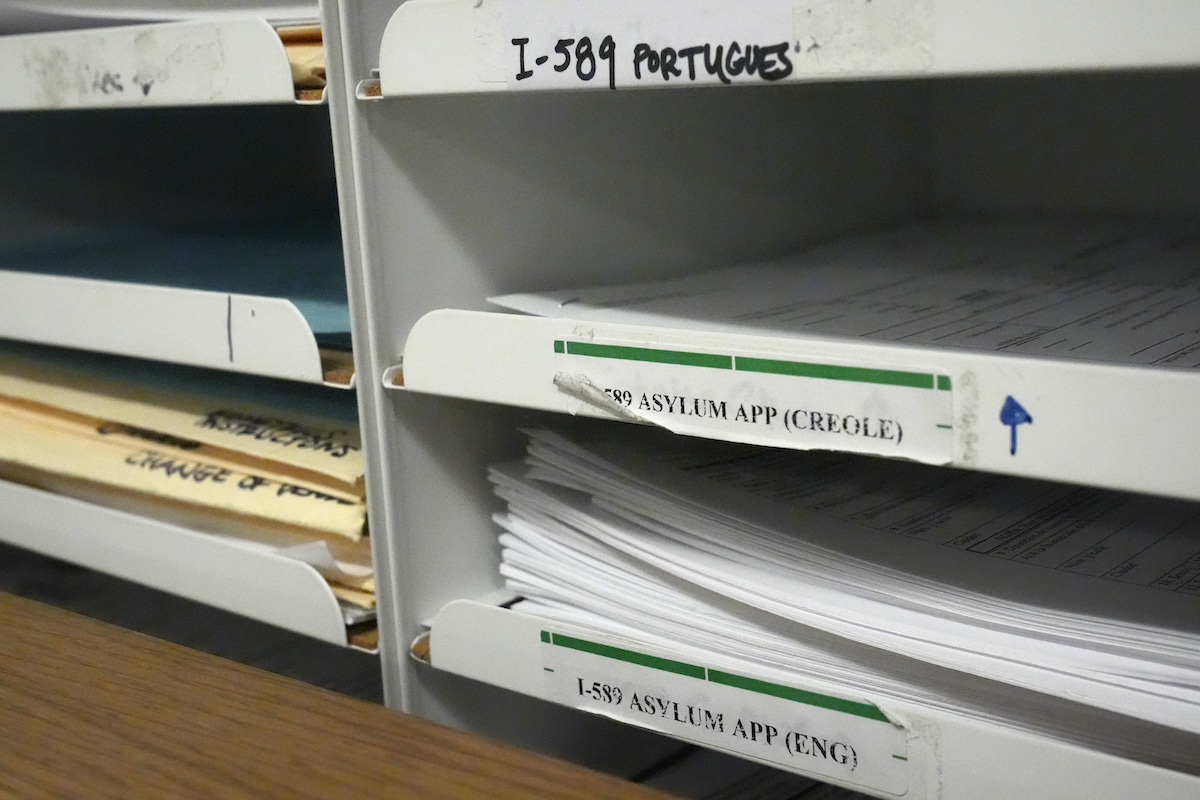Stand up for the facts!
Our only agenda is to publish the truth so you can be an informed participant in democracy.
We need your help.
I would like to contribute

An officer directs people to a courtroom, Jan. 10, 2024, in an immigration court in Miami. (AP)
If Your Time is short
-
A report found that during the Biden administration, more than 365,698 asylum application decisions were categorized as “other remain in U.S.” Immigration and asylum law experts said that category appears to primarily show cases that were closed by prosecutorial discretion.
-
Facing a backlog of cases, U.S. Immigration and Customs Enforcement attorneys sometimes use prosecutorial discretion to close or pause removal cases, experts said.
-
When a case is closed, it means the U.S. government has stopped trying to deport an asylum applicant, experts said. This does not put people on a path to citizenship or lawful presence in the U.S.
Two days before President Joe Biden directed his administration to reduce the number of migrants entering the U.S., his critics expressed alarm over another immigration matter.
"While Trump was being tried in a politically weaponized kangaroo court case, the Biden administration quietly terminated 350,000 asylum cases, effectively granting them mass amnesty," conservative influencer Ian Miles Cheong wrote in a June 2 X post that had more than 720,000 views as of June 6.
His post included a screenshot of a New York Post headline that said Biden’s administration had offered "‘mass amnesty’ to migrants."
On June 3, Joey Mannarino, a conservative political commentator, shared a similar sentiment on Instagram and X; the X post received almost 72,000 views as of June 6.
"Joe Biden didn’t tell anyone or ask Congress for permission, but just gave 350,000 illegal alien invaders effective amnesty," both posts read.
Biden’s key political rival amplified this narrative.
"We recently learned Biden is secretly granting mass amnesty to hundreds of thousands of these illegal aliens," former President Donald Trump said in a June 4 YouTube video.
"Amnesty" has no set legal definition, but experts said amnesty traditionally refers to granting a noncitizen some sort of lawful status. That’s not what happened here.
A close look into this claim’s source shows the people identified as receiving "amnesty" received no such protections. Rather, their cases requesting asylum — federal permission to remain in the U.S. without the imminent threat of deportation — have been closed.
The closure of their cases affords these people neither legal immigration status nor permanent protection from deportation.

Asylum applications in different languages are shown, Jan. 10, 2024, in a room used by Catholic Legal Services for the Archdiocese of Miami to help asylum seekers at an immigration court in Miami. (AP)
On June 2, the New York Post published a story headlined, "Biden admin offers ‘mass amnesty’ to migrants as it quietly terminates 350,000 asylum cases: sources."
It published two days before Biden issued a June 4 directive to limit the number of migrants seeking asylum at the southern U.S. border.
The New York Post article said the Biden administration "is operating a program of ‘mass amnesty’ for migrants." As evidence, it pointed to data from the Transactional Records Access Clearinghouse, a data gathering and research organization at Syracuse University partly focused on immigration-related topics.
In May, the organization released a report on immigration court asylum application case outcomes since fiscal year 2014.
Federal fiscal years run from Oct. 1 to Sept. 30. Biden took office Jan. 20, 2021.
The New York Post’s article relied on data from the report that showed increasing numbers of asylum applicants had been allowed to remain in the U.S. without being granted asylum or other relief since fiscal year 2022.
People who are apprehended for entering the U.S. illegally can apply for "defensive" asylum in immigration court, meaning they are defending themselves against formal deportation and are trying to stay in the U.S.
From fiscal year 2022 to April 2024, there were 365,698 instances in which the asylum applicants were neither ordered removed nor granted asylum or other relief, the clearinghouse’s report said. The clearinghouse’s report categorized the immigration judges’ decisions in those cases as "other remain in U.S."
Susan Long, a Transactional Records Access Clearinghouse spokesperson, said that the report’s "other" category is a catch-all, including cases in which immigrants were allowed to remain in the U.S. for reasons that did not include being granted relief by an immigration judge.
PolitiFact requested a specific breakdown of what the category represented and received no response.
The report said that although the Biden administration has granted relief in a rising number of asylum claims, many other immigrants "have had their cases terminated without a decision on the merits of their asylum claim."
"These terminations have been part of this administration’s efforts to speed decisions on recent cases and close older cases that weren’t a threat to public safety or national security," the report said.
The New York Post’s use of the term "mass amnesty" originated from a quote by Andrew Arthur, a former immigration judge who works for the Center for Immigration Studies, a group favoring reduced immigration. Arthur said the closed cases represent "massive amnesty under the guise of prosecutorial discretion," according to the Post.
Immigration and asylum law experts told PolitiFact that the clearinghouse report’s "other remain in U.S." category appears to reflect cases closed through prosecutorial discretion.
U.S. Immigration and Customs Enforcement attorneys sometimes use prosecutorial discretion to close or pause deportation proceedings when people aren’t considered a priority for deportation.
"There are just not enough resources to catch both a national security threat and the garden variety immigration violator," said Muzaffar Chishti, a senior fellow at the Migration Policy Institute, a nonpartisan think tank. "In a world of limited resources, it’s imperative you establish priorities."
Under the Biden administration, Immigrations and Customs Enforcement officers have been advised to prioritize for deportation people who have recently arrived and who threaten national or public security, Chishti said.
The closed cases represent Immigration and Customs Enforcement "prioritizing cases that it thinks will lead to faster removals" under those guidelines, said David Bier, immigration studies director at the Cato Institute, a libertarian think tank.

A migrant family seeking asylum from Mexico waits to be transported and processed June 5, 2024, near Dulzura, Calif. (AP)
Immigration and asylum law experts said that it would be inaccurate to say the Biden administration granted "mass amnesty" to more than 350,000 asylum applicants.
Bier said that when cases are closed without granting or denying asylum or relief, it signals the asylum seekers are not "being prosecuted for any violation of immigration law at this time."
Paulina Vera, who supervises the immigration clinic at George Washington University Law School, said such case closures mean the U.S. government has essentially said it is "not going to be actively trying to move for your deportation."
With so many asylum application cases waiting to move through the immigration courts, removing cases from the docket cuts the backlog, experts said. In that way, closing cases is a "docket management tool," said Vera, who represents asylum seekers in immigration court.
Chishti described it as being put "in the back of a file cabinet for removal."
But that isn’t an indefinite guarantee. Closed cases can be reopened, experts said. Donald Trump could do this if he’s reelected president in November, Chishti said.
And if people whose cases were closed are later involved in the criminal system, they might get onto the Department of Homeland Security’s radar and be put back in deportation proceedings, Vera said.
"Just because your case was dismissed before doesn’t mean that you’re not at risk of someday being put back in removal proceedings," she said.
So, what happened to the more than 350,000 applicants who received neither relief nor removal orders, according to TRAC data?
Well, mainly, Chishti said, they no longer have to show up for hearings related to their removal proceedings. That appears to be the leading benefit, he said. Many people whose cases are closed could still be considered to be in the U.S. illegally, however, and they gain no additional protections as a result of their case closures — no path toward citizenship, no lawful presence in the U.S. and no basis for a work permit.
"The best thing of course is to get legal status whether that is through an asylum or some other means, like you get married to a U.S. citizen," Chishti said. "If you don’t have any pathways to legal status, then the second best thing that can happen is your case is closed, because you don’t have the threat of removal on your head every day."
Vera said the upshot is a lot of uncertainty: "They’re essentially just sort of here undocumented, in limbo."
PolitiFact Staff Writer Maria Ramirez Uribe contributed to this report.
Our Sources
Instagram post, June 3, 2024
X post, June 3, 2024
X post, June 2, 2024
New York Post, Biden admin offers ‘mass amnesty’ to migrants as it quietly terminates 350,000 asylum cases: sources, June 2, 2024
The Telegraph, Biden administration offering ‘mass amnesty’ to thousands of migrants, June 3, 2024
Donald J. Trump on YouTube, The truth is that Biden’s Executive Order won’t STOP the invasion—it will make the invasion WORSE, June 4, 2024
Fox News, Biden admin quietly dismisses over 350K asylum applications from immigrants since 2022: TRAC, June 2, 2024
Transactional Records Access Clearinghouse, Two-Thirds of Court Asylum Applicants Found Legally Entitled to Remain, May 17, 2024
Interview with Raquel Aldana, a law professor at UC Davis School of Law, June 3, 2024
Interview with Muzaffar Chishti, a senior fellow at the Migration Policy Institute, June 4, 2024
Interview with David Bier, director of immigration studies at the libertarian Cato Institute, June 4, 2024
Interview with Paulina Vera, a professorial lecturer in law at George Washington University Law School, June 4, 2024
Email interview with Susan Long, a spokesperson for the Transactional Records Access Clearinghouse, June 4, 2024
The American Presidency Project, Federal Budget Receipts and Outlays: Coolidge - Biden, accessed June 5, 2024
NBC News, Supreme Court revives Biden immigration enforcement plan, June 23, 2023
Homeland Security, Secretary Mayorkas Announces New Immigration Enforcement Priorities, Sept. 30, 2021
U.S. Immigration and Customs Enforcement, Doyle Memorandum: Frequently Asked Questions and Additional Instructions, accessed June 5, 2024
PolitiFact, Is the Center for Immigration Studies a hate group, as the Southern Poverty Law Center says? March 22, 2017
Justice Department, Department of Homeland Security enforcement priorities and prosecutorial discretion initiatives, Sept. 28, 2023
Department of Homeland Security, Guidelines for the Enforcement of Civil Immigration Law, Sept. 30, 2021
PolitiFact, No, the Biden administration isn’t paying rent for immigrants in the country illegally, May 9, 2024
USA.gov, How to seek asylum in the U.S., accessed June 6, 2024
U.S. Citizenship and Immigration Services, Refugees and Asylum, accessed June 6, 2024






























